|
– DISC 2 of 2 –
| HER LAST AFFAIRE (The BFI lists the year as 1935 but Powell's autobiography cites 1936. The IMdb concurs with both, the first is its year of production, the second its year of release) |
|
This is more like it! I can now see what I've been actively looking for in the box set… directorial evolution. Yes, there are still aspects of what I detailed in the lengthy preface for Disc 1 but this one is a step higher on the craft and career ladder.
VIP politician Sir Julian's wife, Lady Avril, gets a diagnosis of a weak heart. This is what's known as a signpost. She hopes that this won't stop her flirting. OK, good character establishment. As in The Night of the Party, the third film on Disc 1, we have a character, Alan Heriot, in love with his boss Sir Julian's daughter. Sir Julian is, shall we say, grossly unsupportive of this relationship because of the ignominy of Heriot's father's unspecified crimes for which he was falsely accused and punished. He died in prison. Desperate to clear his father's name, Heriot agrees to have a, one assumes, naughty weekend with flirty Lady Avril but instead it's a ploy to force her to write a letter exonerating Heriot's father thereby convincing a class and status-conscious Sir Julian that his name won't be dragged through the mud by association. Heriot's real love is blissfully ignorant of her man's ploy and believes him to be in France on business. Arriving at an inn, Heriot is cold and determined but after Lady Avril writes the letter, they argue and Heriot slopes off downstairs. Upstairs, the signposted weak heart succumbs to the stress and Lady Avril dies in her hotel room…
For a start, the script is much tauter and much more fun. It's written by Ian Dalrymple, Powell's film editor from Walter Ellis's play, S.O.S. Yes, it's still a play but there are lovely touches throughout. A Bristolian policeman has a delightful flurry of exchanges with the hotel maid who carefully drip feeds him information when she thinks it's timed best to help the innocent stay unsuspected. At every revelation, the confounded policeman asks "Well, why didn't you tell me this before?" She has the same answer prepared… "You didn't ask!" Again, we have heard this in countless films after this one but probably extremely few, if any, before 1936. The set design is almost Germanic, especially the Caligarian staircase. There is also possibly the first scream to similar sound cut of a bell ringing in British cinema. You know the trick now but did Powell originate it? Even Spielberg was at it at the start of Jurassic Park: The Lost World (a scream to the rush of a train and a giant yawn from Jeff Goldblum). Once Heriot knows he's in real trouble, we hear his inner thoughts via voice over as he imagines a series of news headlines implicating him in the death of Lady Avril. Again, this technique – not liked by everyone, see the commentary review – was probably, again, very new at the time.
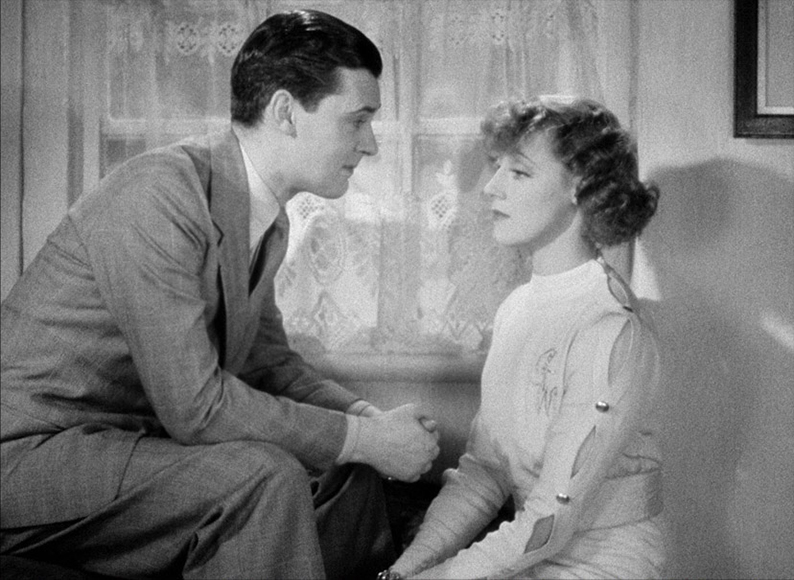
Two cast members were known to me. There's the dependable John Laurie as the Bible-bashing, morally upright innkeeper. He played a similar role for Hitchcock in The 39 Steps (1935). He is also beloved to my generation as Private "We're doomed!" Fraser from the BBC's sitcom, Dad's Army, a role that he was initially sniffy about after all his classics work but it gave him fame and a fair bit of security. Then there's actress Googie Withers in a delightful performance as Effie, the clumsy but big-hearted maid. When I was still in my teens, I was even then a budding filmmaker and saw a play with Withers and wanted to learn about actors so wrote her a letter. She and her husband John McCallum invited me backstage for a lovely chat about the art and craft of stage and screen acting. I will never forget their kindness and what a thrill it was to see her again in 2024 (she died aged 94 in 2011) at the age of 18 exuding a cheeky charisma and knockabout sex appeal. She became one of Powell's thespian regulars.
There's a terrifically edited moment of revelation ( at 67' 05") when one of the leads confesses to past misdeeds. He is prompted to spill the beans by a short shot of his hand clenching lasting 23 frames. The resulting cut to the mid shot is perfect and also as much of a shock as would his confession be to those present. That's cinema for you. We can never be sure that the actual cuts in some scenes were the precise cuts performed by the editor. But at 28' 34" in, we have a flurry of cuts so rapid that it jars and makes me aware that it could simply be damage repaired. There's nothing like this style in the rest of the film or even the rest of the entire box set. They are two shots, one lasting one second and five frames and the second, 14 frames and they whizz by jarringly. It's clear that there is frame damage as a number of shots hop and skip frames.
As the IMDb reminds us… "The only available prints of this film are taken from an edited (by about 20 minutes) post-WWII British re-titled reissue print, which are available on video and television. No prints of the complete, original version are known to exist."
Now could that be the reason for the startlingly fast events of the first four minutes? No sooner does the leading man, Nick (with a wrist tattoo of unknown meaning) get off the phone to his girlfriend June, we find out he's a famous pilot. June's parents convene and her brother Jimmy hassles his father for money. In full Cyrano de Bergerac outfit plus nose, his father is scornful of his own son's profligacy. Jimmy sports the same triangular wrist tattoo as Nick and he exits in a huff (or a minute and a huff, thanks Groucho). Fade to black. All that in fewer than four minutes. Fade up. The leading man, Nick, walks into a room in full evening dress as a masked man strides purposely towards a door. He catches a glimpse of the intruder's own tattoo before being struck to the ground. And all that in eight seconds. I mean what is going on here? Back to the masked ball… June is expecting Nick to arrive fully masked so as to be unrecognisable to her father. Someone matching that description duly arrives. At midnight, the pair plan to elope by car, already prepped by the butler. But the masked man snatches a priceless ornament and flees. He jumps in June's car who's convinced it's her man until he drives over a party guest who get a revolver shot off before getting very realistically run over. Hit in the shoulder, the man bleeds all over June's car and she asks "Who are you?" If I then say we cut to what appears to be a mad scientist with an enormous telescope, dare or need I go on?
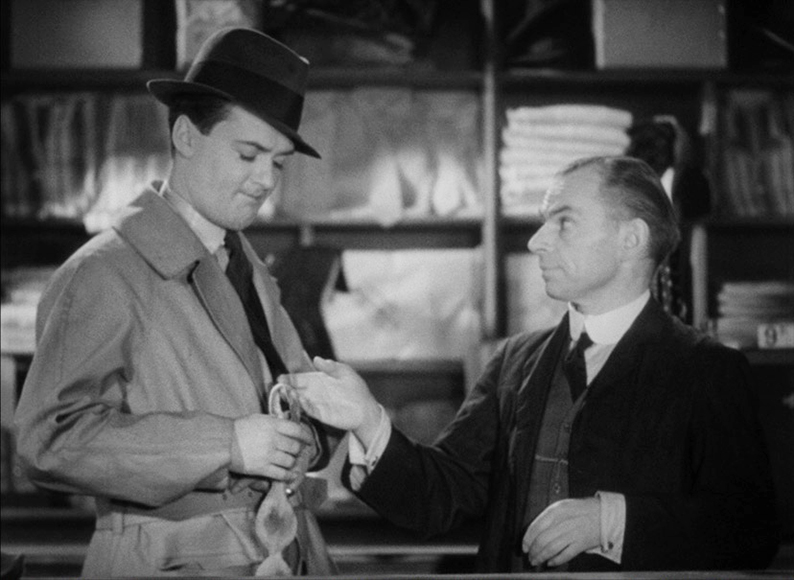
A further notch up in detail, dialogue flair, wit and an awkward dollop of narrative incomprehension, Behind the Mask is silly and ridiculous but also a lot of fun. Cast members seem to be enjoying themselves, with quite a lot of scenery left unchewed. The film shares its leading man with Her Last Affaire, actor Hugh Williams. While some of the action sequences work very well and the editing certainly helps, the car chase murder asks a lot to be completely accepted as believable. Music punches in at the last act (the first time incidental music has been featured in all of the films with the exception of the Gounod piece in Hotel Splendide) and no doubt due to the missing 20 minutes, the music cuts around all over the place. In fact the last act looks like it wandered in from a science fiction B-movie but has charm to spare if not piled high with sense. After one of the villains disables the heroes' car, Nick's friend revs it up and up and looking under the hood, he announces "the petrol pipe is cut." If the petrol pipe is cut why does a sabotaged car still sound its engine? And even roar! I'm leaving the box set after this enjoyable hour but would love to have seen the film in its original entirety. Maybe someone will unearth it…
Each of the two films were shot in the original Academy 35mm aspect ratio of 1.37:1. I won't repeat my general comments about both picture and sound from Disc 1 review's Sound and Vision section but those remarks qualify here for Disc 2 which is hardly surprising. So specifically…
Her Last Affaire
Like Disc 1's content, the restorations have avoided removing faint film damage while the black and white picture has scrubbed up beautifully. If you are looking out for faint water drying marks, scratches and sparkle, they are undeniably there but the strength of the restored image renders them practically invisible.
Behind The Mask
That would be something of a 'ditto' for the final feature in the box set. Again I must stress how much work has gone into making the sound for both crystal clear.
There are descriptive subtitles available for both films.
Newly recorded feature commentary on 'Behind the Mask' by Marc David Jacobs:
Our self-styled film nerd is back for a crack at a second commentary. True to past form, Jacobs spots all the typos in the front titles, hastily and incorrectly assembled for the re-cut of the original 1936 version. He says that the 20 missing minutes were probably ten from the opening (this makes perfect sense given the speed of it) and ten from the close, (again this makes even more perfect sense given the choppiness and sometime lack of sense on display at the end). Apparently Powell wasn't thrilled with this film! Jacob's knowledge is again encyclopaedic and all the cast get their moment in the commentary. He may be working from notes but he can't be reading all this. It does feel like he knows all this stuff authentically. It's amazing and almost obscenely informative.
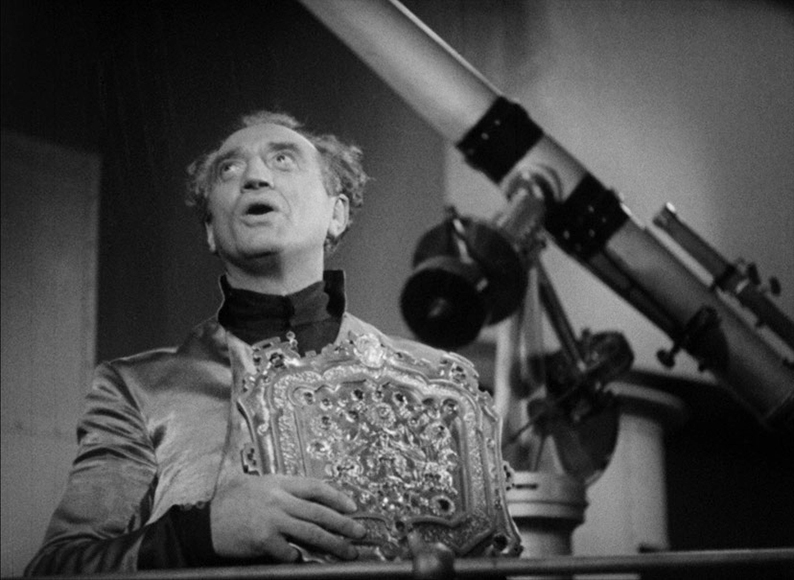
He brings up Erwin Hillier's low angle choices (was Jacobs aware that extracts of this giant interview are available on this disc as an extra?) He underlines the differences between the novel it's based on and it's hilarious how many there are. It reminds me of what someone once said about the truth behind The Texas Chain Saw Massacre. It's based on real events but they didn't happen in Texas, there were no chain saws involved and there was no massacre." Jacob's depth of biographical detail on the henchwoman with barely four lines is almost supernatural. He must have spent most of his life researching his commentaries. My God… he identifies the chicken species in the barn scene! And happily credits his Twitter source! Extraordinary. A massive, respectful slap on the back to Marc David Jacobs for a breathless, invigorating and stunningly comprehensive commentary. I'm absolutely exhausted.
Newly recorded feature commentary 'Her Last Affaire' by Ian Christie
A Powell champion for over 40 years, film historian Ian Christie really had to be included in this box set. His encyclopaedic knowledge of his subject means that all the actors get their moments in the Christie spotlight. His insights on the historical importance of the 30s to the British film industry provide some relevant context. There's a tiny bit of explaining what we are seeing, something the film manages without any further information necessary. Some highlights: Apparently it was a real
novelty to go to an actual distant location, in this case the inn where the death occurs. The BBC often put out public service messages on the radio so this rather shoved in deus-ex-machina radio broadcast was actually common at the time. Christie even knows the model of the aeroplane that delivers suspect Alan Heriot back to the UK from France, one that had a landing speed of 20mph which just sounds ridiculous. But then again, the plane looks ridiculous too.
Christie notes that the BFI's own Monthly Film Bulletin (or MFB) review, noted that it was "confusing rather than helpful…" commenting on the then new technique of using voice over to reveal characters' thoughts. Of course, this is a well-trodden practice folded in to every filmmaker's resource kit. It's just one example of how Powell was pushing filmed reluctant plays forcefully into the immense arena of cinematic art. Christie very succinctly leads us through the journey that led Powell to Pressburger and for that we have Alexander Korda to thank. Finally, Christie reiterates what I said in my preface, that it is impossible to experience these films as they were presented in their day but I, for one, am thrilled we have them as an historical record. A terrific commentary and a fine addition to the Powell canon.
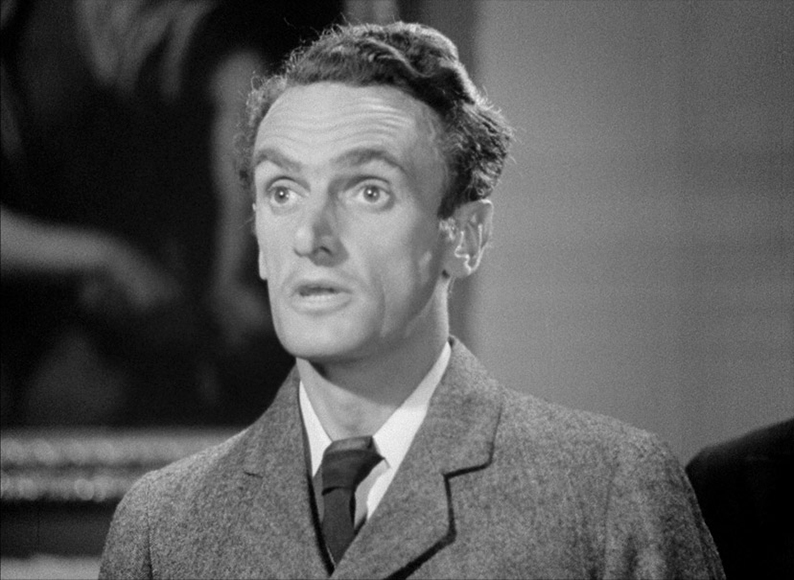
Riviera Revels – Travelaugh (sic) No.1 and No.10 (1927): Powell himself appears in these rare short comedy curiosities from the silent era, with optional audio commentary by Bryony Dixon, curator of silent film at the BFI
Travelaugh No.1 (12' 05")
So Michael Powell once had hair, barely any but just visible under his explorer's pith helmet but it was already thinning. Talk about a revelation. He was all of 21 years of age performing slapstick in these two rather awkwardly named 'Travelaughs'. It's suspicious to me that the arrival of the train at Cannes is shot and cut using the same cheap but effective technique to get a train to stop at a station in Hotel Splendide. Just track slowly past the station name and come to a halt. The music is middle-of-the road cheerful and we are mostly far from British studios actually at Cannes and Lerins Islands to my surprise. Dixon's commentary is very revealing and brings to life Powell's entry into movie making via his slapstick comedy performances. While a young Powell did anything to immerse himself in the film world, it was when he shot a few shots on a camera called an Eyemo and watched the editor cut them in to the film being made, did he say in his first autobiography… "I was lost to all other worlds, I was a movie brat, for ever." I know how he felt. It's been many years since I read the first of Powell's memoirs and had completely forgotten that this was how he entered the film industry. These films and informative commentaries are another great reason to own this Splendide box set (see what I did there?)
Travelaugh No.10 (14' 00")
The return of zoologist Cicero Symp… Powell the clown dives in with a disregard of his own safety as is caught up in a waterwheel. By far the stand out scene in this one adventure was Symp slumbering and dreaming of himself as a faun (Powell) plays pan pipes to an urgent dance by two very good dancers and good friends of Powell's. Dixon's commentary tells us that this may even be the very first Michael Powell directed sequence. I still have a major problem watching the slow torture and death of animals unlucky enough to be born into a bullfighting culture. It never fails to turn my stomach even on 35mm black and white nitrate stock from the 20s. The title cards lie saying no bulls were killed just to appease sensitive British audiences. Powell's description of his comic adventures in a letter to his mother described them as being "taught geography by Chaplin." Dixon ends her terrific and light heartedly witty commentary with a wry "Sounds about right!"
Inside the Archive: Riviera Revels (2024): Bryony Dixon explores the origins of 'Riviera Revels' and Michael Powell's work on them (12' 01")
And here is Bryony Dixon giving us an overview of the Riviera Revels. Anyone who was anyone was at Cannes in the south of France in the roaring 20s. Powell's father opened a hotel in the area and on holiday there, the young Michael is taken on board as a comic actor. The BFI, of course, has copies of Powell's letters to his mother during this time and these are about as valuable a resource as any Powell fan would cherish. He would sign off 'Soon to be famous film director.' Which gives you no small insight into his drive even as a youngster.
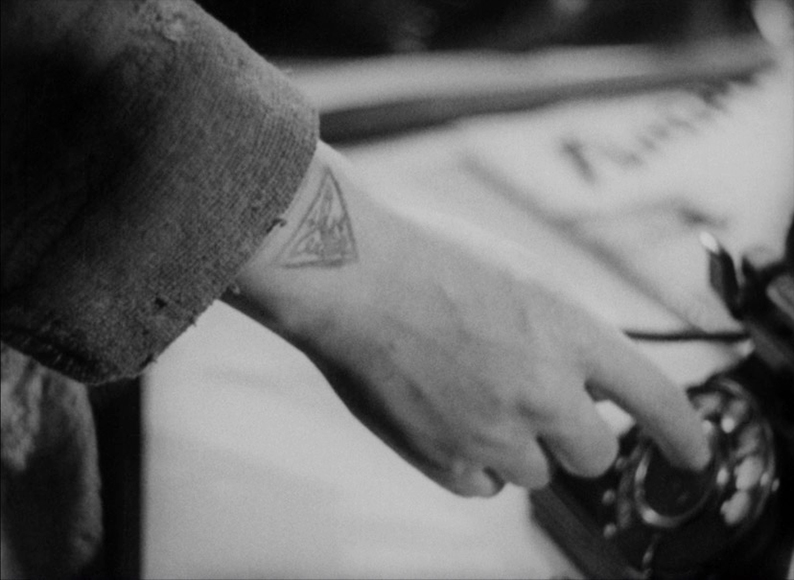
Visions, Dreams and Magic: The Unmade Films of Michael Powell (2023): a new documentary exploring some of Michael Powell's unrealised films (40' 45")
Ian Christie introduces this very slick entry concentrating on the films Powell never managed to realise. He achieved one film produced for every ten that never saw the glow of the projector lamp. James Bell, BFI curator expounds on his love of Powell's work touching on points that I personally respond to. He also acknowledges that Peeping Tom went some way to derailing Powell's career but also notes the context at the time and suggests the reason for Powell's difficulties beyond 1960 were a lot more complex, a gradual process over eight years. Ex-wife and Scorsese's extraordinarily brilliant film editor, Thelma Schoonmaker, donated a great many boxes of Powell's unrealised projects to the BFI. It should not come as any kind of surprise that one of those projects was Shakespeare's The Tempest. It's essentially the story of an exiled magician. Remind you of anyone? Thirteen Ways to Kill A Poet was a 13 part TV series with the most extraordinary roster of 80s directors and artists attached at one point or another but… It had 'poet' in the title. Powell and his supporters could not find interest or money. The documentary covers a few more details of a handful of projects in what must tally in their hundreds. This extra is a fascinating and absorbing glimpse of what might have been.
Interview with Erwin Hillier (1988): in these extracts from an eleven hour interview recorded by the British Entertainment History Project, cinematographer Erwin Hillier recalls working with Michael Powell (26' 29")
OK, Hillier's first encounters with Powell lead him to call him 'aggressive' and 'a bully'. OK. Not too much of a stretch. He had the reputation of pushing crew and actors and whomever pushed back would earn his respect. Hillier was the camera operator on the fifth title in this box set, Behind The Mask (1944). He talks about suggesting extra shots to the director resulting in horrendous working hours. But here is proof that Powell and Stanley Kubrick shared receptivity, both being happy to take suggestions but both men pushed technicians and actors to go beyond what they thought they were capable of. That behaviour usually results in two paths of emotion; one - frustration, anger, breakthrough, acceptance and pride or two – frustration, anger, and off the picture.
This extra, understandably, is about Hillier himself so Powell stories are not front and centre so if Powell is your interest (and why are you here if he's not?), then the opening of the interview is the part to listen to. This isn't to denigrate the second half of the interview. Memories from a valued technician are always worth listening to. That said, he does come back to a few Powell stories at 21 minutes somewhat repeating himself. He talks about how he loved to shoot from such low angles. This intrigued Powell and he and Hillier became friends. Hillier of course went on to shoot A Canterbury Tale and I Know Where I'm Going as cinematographer. A fascinating extra even if a bit abruptly terminated.
Image Gallery (2' 49")
Like Disc 1's gallery, this one goes at its own pace. All are in black and white. For Her Last Affaire, we have four stills, three Front-of-House stills, two publicity portraits and four pages from the ad campaign. For The Man Behind the Mask, we have six stills, one Front-of-House still, an eight-photo single still and one poster.
The Archers in Argentina (1954): Michael Powell and an international film-star entourage are captured on camera at an Argentinian film festival in this home movie footage shot by Emeric Pressburger, with optional audio commentary by Marc David Jacobs (20' 43")
This surprisingly colourful 'home movie' just shows how adaptable and superb the medium of film is. There's no way a 'home movie' is shot on 35mm film so I assume this is 16mm and on a 4K TV it still looks superb. I can confirm it is 16mm from page 39 of the booklet. The musical accompaniment is suitably South American in flavour but to get the most out of the material, play the commentary. Jacobs liberally quotes from Powell's 2nd volume of autobiography, Million Dollar Movie. This film does tend to show you how the other one millionth lives… Pressburger is no Jack Cardiff but his film does celebrate what sometimes must have been the whirlwind of international stardom.
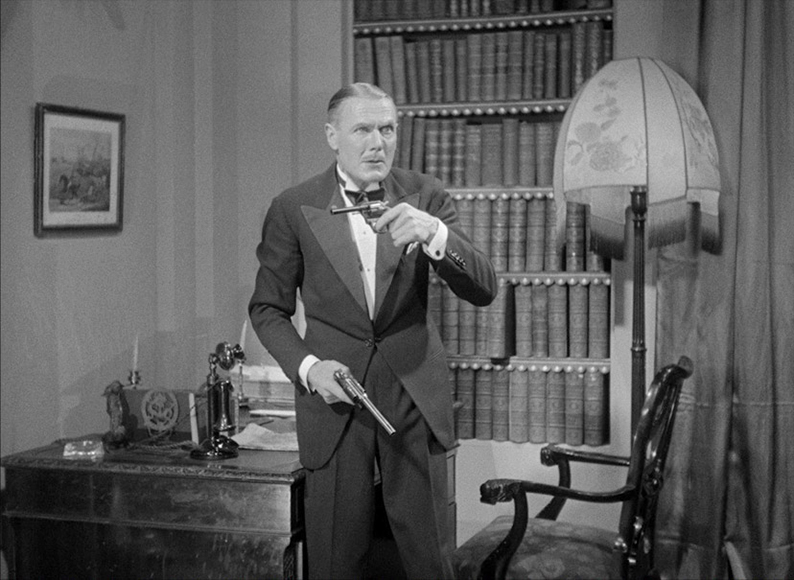
Booklet featuring contributions from James Bell, Marc David Jacobs, Lawrence Napper, Pamela Hutchinson, Ian Christie, Bryony Dixon, Dr Josephine Botting and Kieron Webb
A Real Talent Shot Red-Hot Into The World by James Bell is an informative piece on Powell's start in the film industry. Captivated by an article on filmmaking in the magazine Picturegoer at the age of 15, Powell was fascinated by the craft and artistry of seizing the moment and capturing magic on film to move an audience. I can sympathise completely and remember when film affected me deeply enough to give my professional life to its thrills, pleasures and cruel vicissitudes. There are a few gaps in knowledge filled by this tight essay with no fat on any bones. Based on what we know about Powell from many sources, even I managed to pick up a few facts that I was not aware of which is a real feat. Nice work, James. He's also interviewed in picture in a few of the extras and wears his Powell enthusiasm with pride and clarity.
The Films: Rynox cast and credits.
Michael Powell, 1931 or: When is a Quickie not a Quickie? is written by self-confessed film nerd, Marc David Jacobs. And he doesn't disappoint. Jacobs charts Rynox's surprising initial success eclipsing an expensive Buster Keaton Hollywood comedy it was there to support and the early championing of Powell by weary British critics who had no homegrown movies to write (home) about. It's no surprise to me how intricately researched the article is and it's full of some lovely surprises. There is a missing closing bracket at the very end of the piece but quibbling over such trifles is below me. (QED. No it isn't – Ed.)
The Films: Hotel Splendide cast and credits.
Fast Work in Economy Class by Lawrence Napper takes us through the context of the business in which Hotel Splendide was made outlining the faithful crew members who were enthused by Powell straining for quality with a meagre budget. He fills in some background on the star, Jerry Verno whose comedy acting I found a little grating. Context, sir. Context. He finished his informative piece with a breakdown of how Powell delivered a man who thought he was now wealthy to the splendid hotel of the title which he'd inherited. The trick? Close ups. No sets were needed, just artfully framed shots that gave you the information you required at the tiniest fraction of the budget. That and a couple of stock shots of trains whizzing by.
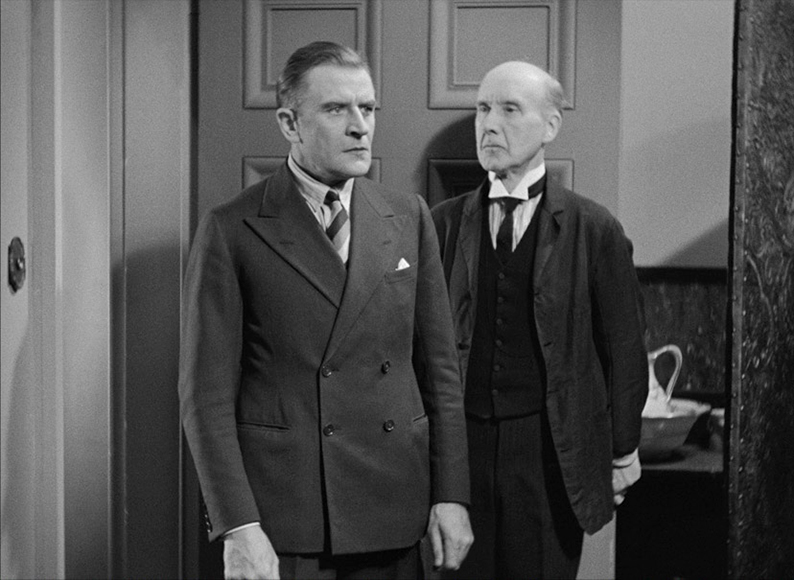
The Films: The Night of the Party cast and credits.
All The Nicest Games are played in the Dark by Pamela Hutchinson quickly deals with the contempt Powell originally had for a film he feels tricked into taking on. She then proceeds to suggest the director's judgement was way too damning outlining the things that were well worth Powell's time and effort. She draws parallels between press barons and studio executives and suggests that the former have a tradition of being villainous characters. Murdoch is just the current example of the species. It seems that Variety cut the film some slack understanding that it was made to be a light frothy comedy while the Brits were less enthusiastic.
The Films: Her Last Affaire cast and credits.
More Than A Quickie Affair by Ian Christie introduces us to the reasons for the quickies' existence in the late 20s and 30s and how Powell was able to forge a director's career on the back of these often undervalued works. A lovely detail which articles like this thrive on was the fact that to use working stage actors, filming often had to take place at night after the actors had finished their plays. Christie notes that this would have the effect of some actors literally sleepwalking through their roles. He credits the talent both in front and behind the camera and remarks that he got the sense from the film of two young men "itching to move beyond the confines of the quota period, to work on more topical and original material." Well, one of them did just that. Her Last Affaire was film editor and writer Ian Dalrymple's last editing credit. He went on to amass 37 credits as a writer/producer with a solid career if not as feted as his writing partner's.
The Films: Behind The Mask: Abridged Reissue Version of The Man Behind The Mask cast and credits.
A Game of Chess written by Marc David Jacobs introduces an emotionally charged response to the treatment of one of Powell's (and Pressburger's) greatest triumphs, the extraordinary The Life and Death of Colonel Blimp. Inevitably, this treatment is compared to a lesser effort and its recut and release. Jacobs muses what one cinemagoer may have felt seeing the same name responsible for the butchered Behind The Mask and a film playing in the cinema opposite, a certain The Red Shoes. It's a lovely idea. Jacobs is also mining any source of information that can confirm what was in the 22 ½ minutes cut out. It seems from an obscure review at the time that there was a chess match at the climax which makes some sense of the Master's petulant outburst of defeat.
Special Features
When relevant, there are separate introductory articles on each of the special features (not including commentaries). It is all good background information but there is no written credit for these articles.
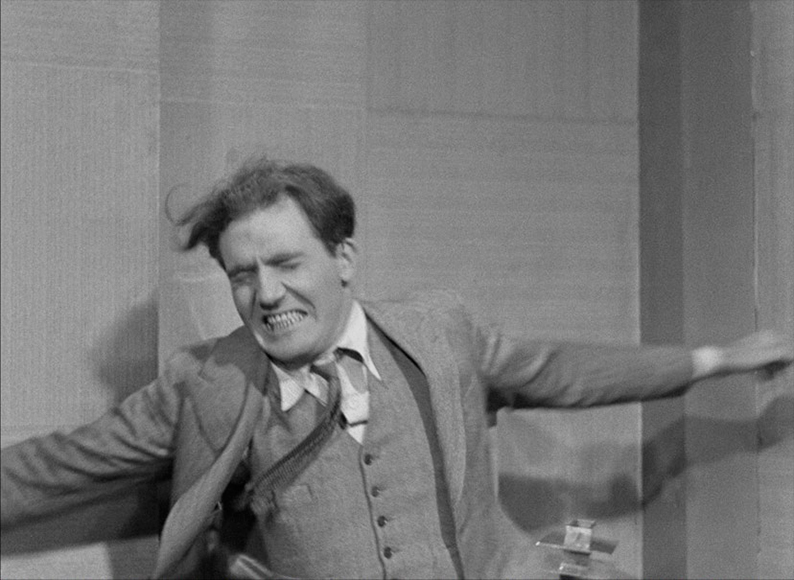
Powell's Missing Legacy written by Josephine Botting is a love letter to the allure of the 'lost film'. There is a similar allure to the words 'un-cut!' plastered on a VHS cover with the rather silly promise that you're now able to see something someone else deemed it best you normally weren't able to. As an editor, all I imagine from that word 'un-cut' is you open up the box (which would have to house scores of VHS tapes) and then proceed to play hours and hours of un-edited rushes. There is inevitably a tiny bit of repetition – and I have to say how well produced the whole box set is because while there is repetition, it's often nestled in with a lot more newly unearthed information. This makes this box set even more useful. I actually feel like I've been on an educational journey and it has been hugely enjoyable. Botting describes the provenance of the other films the BFI have managed to find. She credits those who have made these finds possible and their generosity for loaning the BFI original negatives and prints.
Notes on the Remastering by Kieron Webb is a step by step – somewhat simplified for understanding's sake – guide to the restorations. Film is a magical medium but despite its longevity, it is horribly vulnerable to the physical world. Today's generation will never have the slightly irritating experience of watching a film criss-crossed with dirt and scratches and missing frames (unless they seek those experiences out). Image perfection is now de rigueur and why would anyone lament the loss of film damage? Well, you could say why would anyone lament the loss of silent films (which were never silent) just as that artform was about to fly… Loss is part of evolution but those who've experienced it can still afford a nostalgic glance in the rear view and smile at that persistent wriggling hair jammed in the gate…
Michael Powell: Early Works is an absolutely fascinating companion to the first volume of Powell's autobiography A Life In Movies. All five films all have their interesting points, particularly when the shackles of the stage play proscenium arch are shaken off but there is no getting around the fact that all five are films of their time directed by a man at the start of his career using them as sometimes awkward stepping stones on which to hone, skip and jumpstart his craft. I found the experience of viewing them and the terrific set of extras utterly compelling due mainly to my love of his later, infinitely more sophisticated work with Emeric Pressburger. These are not films for the casual cinema goer or today's screenagers. But if you are a Powell fan, they are a tantalising glimpse of an emerging talent. For that reason alone, I can heartily recommend this box set.
<< DISC 1
|